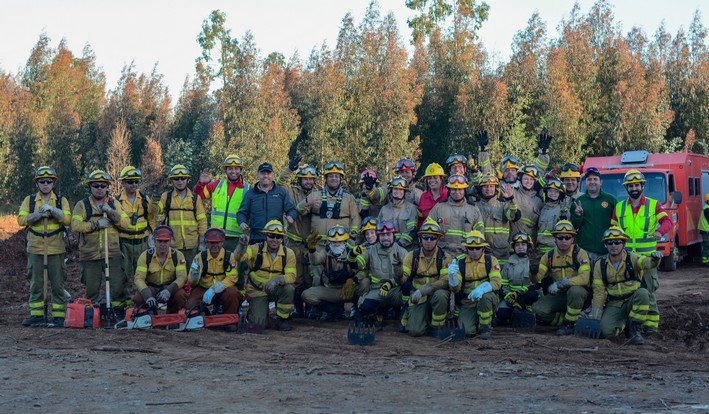With this year's efforts, 108 companies will be trained before the start of the wildfire season, considering the 66 that will complete the course in these months of 2024, reaching approximately 900 volunteers.
At the CMPC Mininco House in Villa Mininco (La Araucanía), 16 volunteer firefighters from four Collipulli companies—a high-risk emergency zone—participated in training provided by the forestry company.
Gaining more knowledge and tools is key, given the complexity of rural fires, both in combat techniques and logistics. Under this context, CMPC launched a plan last year to train 700 volunteers from 42 companies in regions from Maule to Los Lagos for such emergencies.
The initiative was a success, with strong reception from volunteers, leading to an ambitious expansion of its goal: training nearly 5,000 volunteers from almost 300 units deployed in the southern zone within three years.
With this year's work, 108 companies will be reached before the wildfire season begins, including the 66 completing the course in these months of 2024, totaling around 900 volunteers.
Collipulli Firefighters Train
The course is taught by CMPC wildfire supervisors. In Villa Mininco, Felipe Yáñez, a firefighting supervisor from Sernofac (Nacimiento Forest Services), also provided support.
The training consisted of two parts: The first was a theoretical session where professionals were taught firefighting tools, how to differentiate between rural and forest fires, firefighting stages, and firebreak construction methods, among other topics.
The second part involved practical exercises on company grounds, where volunteers learned to use the provided equipment. There, they practiced strategies and actions to contain and combat flames, including manual firebreak construction with the tools supplied.
Putting Learning into Practice
After the theoretical class, volunteers moved to a nearby wooded area, where they first observed a CMPC ground crew performing real-time firebreak, cleanup, and clearance exercises before replicating the same tasks themselves.
José Vásquez, a firefighter and municipal health worker in Collipulli, noted, "Today, things are very modernized; we’ve encountered advanced methods. We used to have fewer logistical capabilities. There’s a lot of emphasis on safety."
Meanwhile, Pablo Pereira, captain of the 2nd Collipulli Fire Company, appreciated "learning about the work of forestry companies, their crews, deployment, and how they handle emergencies—where we often collaborate in firefighting efforts."
When asked about the most valuable part of the course, Pereira highlighted "communication. Establishing incident commands during emergencies is crucial for better, faster, and more effective work."
Ignacio Lira, Corporate Affairs Manager of CMPC Bosques, stated, "The work with fire companies has been highly relevant. We’ve contacted all nearby companies to train under this program and ensure coordinated efforts in case of fires."







Comments (0)
No comments yet. Be the first to comment!
Leave a comment